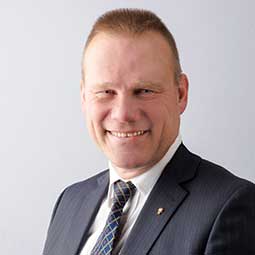5 Questions: Christian Becker
Posted on December 21, 2015 |

Christian P. Becker, MSRT, RRT is a respiratory therapist with more than 40 years of experience in all phases of cardiopulmonary care and chronic cardiopulmonary disease management. He has created and implemented cardiopulmonary rehabilitation programs for inpatient and outpatient settings in hospitals, skilled nursing facilities and outpatient centers. He has also developed smoking cessation and cardiopulmonary disease-specific support groups for the community.
He is a member of Lambda Beta (the national honor society for respiratory therapists); is a steering committee member for the NY COPD Coalition; and is a clinical assistant professor for the respiratory therapy program at SUNY Stony Brook.
What is the biggest challenge you face in improving the lives of people with COPD?
The biggest challenge that I find is in access to care (particularly pulmonary rehab) for people with COPD. Large metropolitan areas have different issues than rural or suburban areas. The challenges range from the affordability issues for patients, being able to provide the service and have a sufficient profit margin to keep the lights on in the clinic while maintaining a livable wage and employee benefits. Patient transportation issues, continuing care/management, home care, all have important care aspects that are beneficial for COPD patients, but no one wants to pay for it.
What do you think is the single most promising practice in COPD diagnosis or care right now?
Pulmonary rehabilitation is (without a doubt) the single most promising treatment practice in COPD care right now. The term “rehabilitation” is a misnomer. You can rehab a knee or a shoulder, but once function, range of motion, and strength are restored, the rehab is done. Pulmonary rehabilitation is actually a disease management program, which encompasses the entire spectrum of care once the diagnosis is made. It is an individualized plan of care that addresses not only the patient’s pulmonary condition but any other systemic complications (e.g., CHF) and co-morbidities.
If you had a magic wand, how would you improve COPD care?
I will admit to some professional biases here, but I truly believe that COPD care can best be improved by having the services of a registered respiratory therapist be reimbursable by CMS across the entire healthcare spectrum from the hospital, doctor’s office, skilled nursing facility and home; just as with physical therapists and nurses. I have the utmost respect for those professions, but no one (other than a pulmonologist) knows COPD management better than an RT. We understand the interface of our therapeutic modalities and the patient better than anyone.
What is one aspect of COPD diagnosis or care you think is too often overlooked?
Patients who require home oxygen therapy are being given systems that are inadequate to meet their needs. The equipment is usually being provided by the “lowest bidder” and too many times, these providers are taking shortcuts in the delivery of these systems, such as not having a respiratory therapist doing an in-home assessment to meet the patient & the family, do a proper instruction in the use, maintenance and need for the therapy, etc. The delivery of home oxygen therapy is not patient focused as a result.
What do you think will be your most important contribution to improving the lives of people with COPD?
I count my most important contributions one at a time with each patient that I care for; to quote my favorite poet: “To know that even one life has breathed easier because you have lived – that is to have succeeded,” Ralph Waldo Emerson.
This page was reviewed on March 5, 2020 by the COPD Foundation Content Review and Evaluation Committee